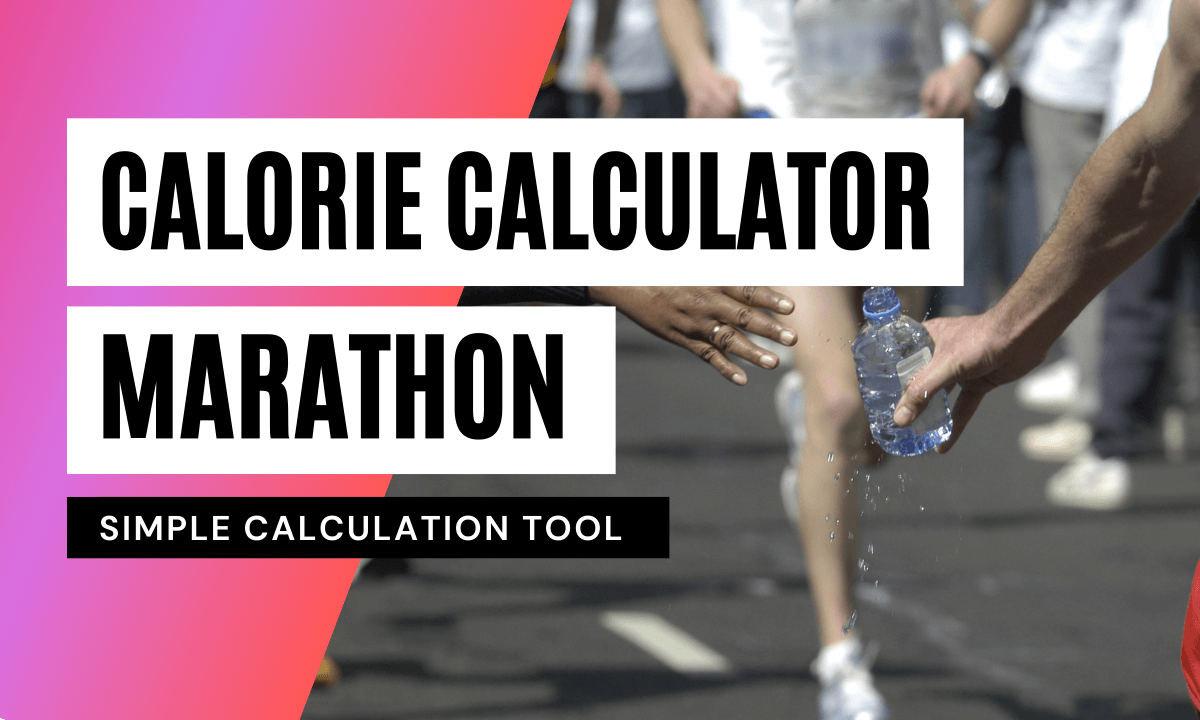The calorie consumption during the marathon can be calculated very easily.
All you need is your own body weight. The speed has a subordinate role in the case of a fixed distance, as is the case with marathon running.
Although the calorie consumption is naturally significantly higher at a fast pace than at a slow pace, since a marathon runner who covers the 42.195 kilometers in two and a half hours compared to a marathon runner who needs five hours for it, is of course only running for half as long, the increased calorie consumption due to the faster pace balances out again with the shorter running time.
Factors that influence calorie consumption in a marathon
However, body weight has a considerable influence on calorie consumption during a marathon. If, for example, two runners weighing 70 kilograms and 100 kilograms each complete the marathon distance in three and a half hours, the marathon runner weighing 100 kilograms will have burned significantly more calories (approx. 1,200 kcal more), as the energy expenditure for "transporting" 100 kilograms of body mass is naturally significantly higher compared to the 70 kilograms. Other factors, such as age, gender, average heart rate during exercise and training condition also have an influence on calorie consumption, but these influences are very small.
Accordingly, for a fixed distance, it is actually sufficient to know our body weight. The following formula has been established for this purpose:
Body weight in kilograms * Distance running * 0.95
With the following tool you can calculate your calorie consumption during the marathon:
Calorie consumption calculator: calculate kcal during marathon
Table: Calorie consumption during marathon
| Weight in kg | in lbs | Calories consumption |
|---|---|---|
| 40 | 88 | 1.603 |
| 45 | 99 | 1.804 |
| 50 | 110 | 2.004 |
| 55 | 121 | 2.205 |
| 60 | 132 | 2.405 |
| 65 | 143 | 2.606 |
| 70 | 154 | 2.806 |
| 75 | 165 | 3.006 |
| 80 | 176 | 3.207 |
| 85 | 187 | 3.407 |
| 90 | 198 | 3.608 |
| 95 | 209 | 3.808 |
| 100 | 220 | 4.009 |
| 105 | 231 | 4.209 |
| 110 | 243 | 4.409 |
| 115 | 254 | 4.610 |
| 120 | 265 | 4.810 |
Weight in kg | Calorie consumption in kcal
Thus, calorie consumption increases by an average of almost exactly 200 kilocalories per five kilograms of body weight during a marathon.
A few important notes on this:
1) Calculation based on absolute calorie consumption.
The "absolute calorie consumption" is always given. However, since we also consume calories during inactivity, this does not mean that, for example, with a weight of 90 kilograms, we consume 3,207 calories "extra" "thanks" to the marathon. Because we also consume calories while sleeping or working. Basically, a person consumes about 2,000 to 3,000 calories on a "normal day" without exercise. So we can assume that we consume 100 kcal per hour when we are inactive. So if we need four hours for the marathon, the relative calorie consumption for the 80 kilogram man would be around 2,800 calories (3,207 - 400).
2) Consider nutrition during the marathon
Those who run the marathon faster usually consume slightly fewer calories during the race, because the goal is reached faster. Accordingly, the calorie deficit in a faster marathon run may be slightly higher than the calorie deficit in a long endurance run. However, the differences are only marginal.
3) Consider the afterburn effect
If you are now a little disappointed that the relative calorie consumption during a marathon is not so high after all, you can rest assured. Because after intense athletic exertion, we also consume more calories in the hours after the activity. This is due to a more active metabolism. The more intense the activity, the stronger the afterburn effect. So after a marathon this is guaranteed to be very high. Unfortunately, the afterburn effect is weakened by the intake of carbohydrates. However, we need these as soon as possible after long sporting activities.
4) Consider the training
If you train for a marathon, you are very likely to live a very healthy life. Because training is the main reason for this. Through the long endurance runs, we also burn a lot of calories. For example, if we run 28 kilometers in training, we burn at least two-thirds of the calories needed for the marathon. Ergo, as a marathon runner you are much more flexible with your diet. Fasting is not necessary, and in most cases it is not effective at all. Above all, carbohydrates and proteins are absolutely necessary after and in some cases also before sports, so that we can successfully endure such long endurance loads.
Those who run a marathon or train for a marathon must therefore be less concerned about calorie consumption than about calorie intake.
Very interesting: The 25 most beautiful marathons in the world
Summary: These factors affect calorie consumption in a marathon
- Weight - very strong influence
- Afterburn effect - medium influence
- Pace - small influence
- Running time - small influence
- Heart rate - small influence
- Gender - small influence
- Genetics - small influence
- body size = small influence
- Age - very small influence




![Running in Seattle • All Races 2024 [Running Calendar] Running Races in Seattle](/images/thumbnails/raxo/ramp/tb-w300-h100-crop-int-3065b2b2d4ba36555aa938dc3d371e7e.jpg)



Kommentar schreiben